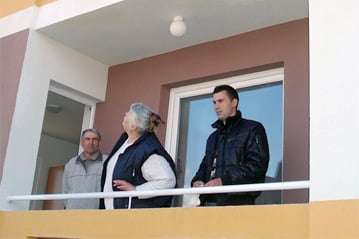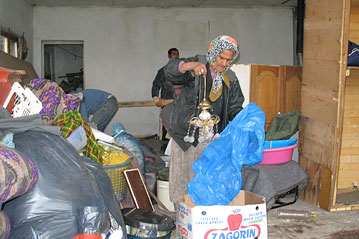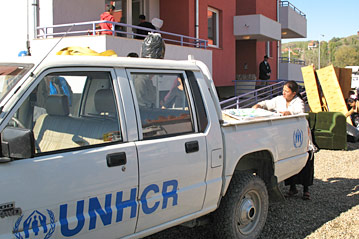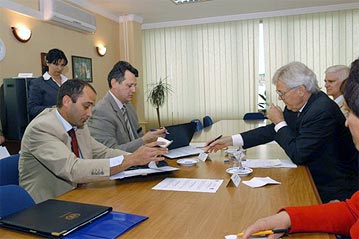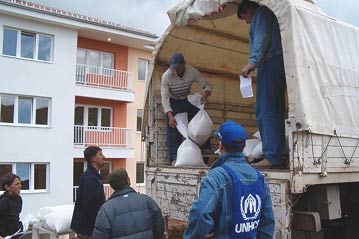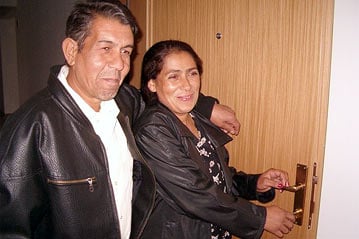Feature: Despite highs and lows, Serbs are back in Kosovo's Zupa valley
Feature: Despite highs and lows, Serbs are back in Kosovo's Zupa valley

ZUPA VALLEY, Kosovo (UNHCR) - They call him the "acrobat" even though he has never worked in a circus before. But Zoran Stevanovic, 66, has pulled quite a few stunts in his quest to return to his homeland in southern Kosovo.
During his three years in Strpce, he repeatedly tried to go back to his home in Zupa valley despite warnings by the international Kosovo Force (KFOR) that it was not safe enough for return. Stevanovic originates from Prizren, but when he found his house destroyed on a go-and-see visit organised by the UN refugee agency, he decided instead to go to his small summer house at the heart of the valley, in Sredska.
In one attempt, he walked all the way down to his deserted village, but was sent back by the international troops who were worried about his safety in the village. In the last attempt, determined to remain there, he hid for four days before being discovered by KFOR, who eventually left him alone.
This was July 2002 and Stevanovic has not left Sredska since. "I didn't do anything, I always had good relationship with everyone. What should I be afraid of?" he says.
When he arrived in Sredska, the door and all the windows to his house were gone. It was not the same house as before, but then again, Stevanovic is not the same man either.
In mid-1999, nearly 200,000 ethnic Serbs and Romas fled Kosovo as Serbian forces withdrew from the province and NATO-led KFOR took over. Those fleeing feared retribution by the province's ethnic Albanian majority. Only a small portion of them has since gone back.
Alone and without waiting for international help, Stevanovic paved the way for a slow and steady return of the Serbs to Sdredska. Once considered the capital of Zupa valley, the village counted 211 inhabitants up till 1999, all of them Serbs.
"I couldn't keep on living far away from here," Stevanovic explains. "I live in Sdredska, and I go back to Prizren whenever I want. I take the bus [UNHCR's twice-weekly bus running between Prizren and Strpce], or hitch hike. I always find somebody for a ride."
Everybody in Prizren knows him as Cambaz, which could mean either "the acrobat" or "the horse dealer". He was never an acrobat and has never sold horses in his life, but he says, "It's nice to walk around Prizren and see that people still call me like they used to."
To prove that the mixed village can co-exist peacefully, he adds, "I was with Albanian friends for Bajram, I wished them a serene celebration and we stayed together." Fiter Bajram, which marks the end of the holy month of Ramadan, is an important celebration for Muslims worldwide.
Following Stevanovic's example, seven people have come back to Sdredska spontaneously so far. Srecko Jaksic, who arrived in early February, says, "I'm happy now.... I'm a Kosovar, I cannot think to live in another place but this land."
In 1999, Jaksic was arrested by soldiers from the Kosovo Liberation Army (KLA) and released after 10 days. But instead of following his sons to Montenegro and Macedonia, he decided to stay. So for three years he lived in a temporary community shelter known as the "seminary", taking care of the people living there.
There is no checkpoint in or near Sdredska; the German KFOR is based in a school building. Most of the houses are in need of minor repair, not complete reconstruction. But much remains to be done as water and electricity are still a problem. And it gets lonely in winter.
"Spring is close, other people will return," said Jaksic optimistically, waiting for his friends to return from the seminary.
In the northern, mixed village of Mushnikova, where the community is bigger, 18 Serb families have returned over the last three years.
"Muslims represent the majority, although their actual ethnic background has always been considered Bosniak, from the surrounding villages," says UNHCR field officer Wojtek Wilk. "Freedom of movement for the Serbs is quite good in the village, but still a problem outside. In general, they feel uneasy to travel to Prizren town. They still do not use the local health system, and rely on the twice-weekly visit of a nurse coming from Strpce."
Wilk and the rest of the field office for the Prizren region know them all, having helped repair their houses, distribute food, deliver beds, firewood and stoves, and co-ordinate assistance with other agencies.
Nestled at the top of the valley is another village, Gornje Selo - a mixed Albanian and Bosniak village up till last autumn, and the last stop of the bus going to Strpce. Slobodan Vuckovic was the first to return last September, leaving three sons and their families in Serbia. His wife Ivanka arrived when the house was rehabilitated.
"We lived in a rented apartment in Belgrade. Life was difficult in Serbia," says Vuckovic. "Our roots are here. We shop in the village, but you can't find everything, so we still go to Strpce. Now Prevalac pass is closed because of the heavy snows. It's hard, but at least we are back in our house."
Remembering the good old days in Gornje Selo, Vuckovic flips through some photographs of a celebration and explains, "My brother Lazar was a famous poet. He died in Ohrid in 1966 when he was only 26. There were many celebrations in his memory in the village and in Pristina. The last one was in 1997."
It is such happy memories that have brought people like Stevanovic and Vuckovic back to Zupa valley. But there can be no collective memory without a community, and as Ivanka serves coffee to her guests, she sighs and hopes that the next cup will welcome someone returning home.
By Monica Ellena
UNHCR Kosovo

